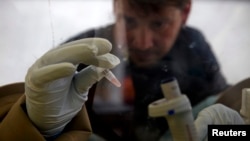The World Health Organization reports it is launching two initiatives to stimulate the development of better and faster Ebola diagnostic tests for use in heavily disease-infected West African countries.
Sensitive Ebola diagnostic tests are urgently needed to stem the transmission of this fatal disease in Guinea, Sierra Leone and Liberia, the U.N. agency said. It said said cumbersome, slow and complex tests have hampered efforts to contain the outbreak.
More than 12 WHO mobile laboratories have been deployed in West Africa. They use a test that provides accurate results when performed by trained staff, which is not always available. Each test requires a full tube of blood, takes from two to six hours, and costs around $100.
Those requirements are challenging in West Africa, severely limiting testing ability, said Pierre Formenty, who leads the organization’s emerging and epidemic zoonotic diseases team.
When the number of Ebola cases in West Africa begins to decrease, he said great effort will be needed to chase down the last Ebola case to declare the epidemic over.
"So, we will need in four to six months from now to increase the number of laboratory tests to be sure that we are not missing cases," Formenty said. "To do that increase, we need to change our strategy in terms of the laboratory. We need to augment the number of tests. ... We will really need to find the very last cases of Ebola."
Reducing obstacles
Formenty said the WHO is minimizing the barriers faced by diagnostic companies to develop and deploy their tests. He says the U.N. agency will collaborate with manufacturers, academic researchers and staff from Doctors Without Borders, among others, to move the process forward.
In four months, two types of tests will be in the pipeline, he predicted. One is a rapid test and the other is an automatic version of the current test.
Laboratory technicians will need to diagnose between 1,000 and 10,000 cases per day, he said. "So, you need a lot of these kits and today it is not possible to do that” in the mobile labs, even with considerable expertise.
"We really need easy-to-use diagnostic tests and we will need, of course, to build the lab that we are talking about for each district, but also to train the people to do these tests," Formenty said.
WHO officials said the new rapid diagnostic test should produce results in 15 to 30 minutes, cost just a few dollars and have no bio-safety requirements beyond wearing personal protective equipment.




